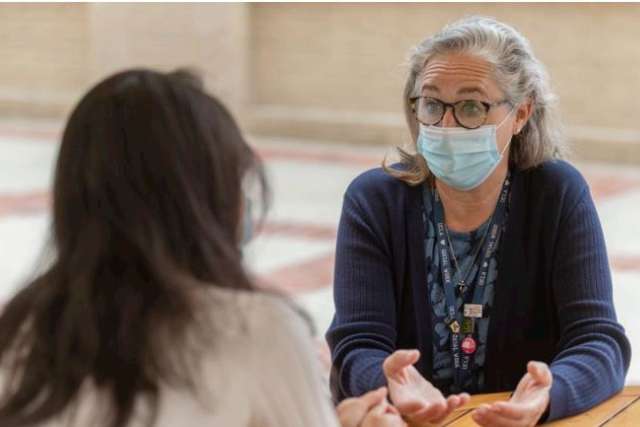No one was left untouched in this year of pandemic-wrought losses. More than 33 million Americans were sickened, and more than 590,000 died. Millions of jobs were lost, and school and home routines upended. Family gatherings were postponed or canceled. Social connections were fractured. “During this pandemic, there are folks who are on yachts, there are folks who are on boats, there are folks who are in canoes, there are folks who are on a raft and then there are people who are holding onto a log. But we are all adrift,” says UCLA social worker Gina Kornfeind, a support and bereavement coordinator for the Pediatric Pain and Palliative Care team. Kornfeind and UCLA adult and child psychiatrist Jena Lee, MD, offer perspectives on weathering and emerging from this COVID-19 year of loss.
Why do the losses feel so profound, even for those of us who’ve managed to avoid illness?
Dr. Lee: “The losses we face are much deeper and more pervasive than many may think. What’s so hard to cope with in this loss is that it’s not just a loss of jobs and a loss of school days; it’s a kind of very ambiguous sense of loss that continues to accumulate.”
Why does the loss of routine, or even something as simple as missing a yoga class or book club, lead to such sadness?
Dr. Lee: “Almost everyone’s coping mechanisms are stifled — the things that we do to cope with our daily struggles, even if we don’t realize consciously that they’re coping mechanisms. Our sense of identity, of feeling fulfilled and of self-worth, is being cultivated in a lot of what we experience socially. So, without these activities, it’s not just the social support that’s lost, but it also can feel so overwhelming — and it is — because it takes a toll on our sense of identity. These group activities that we had before COVID, they really serve to help us feel like we matter. It’s not just the yoga that made yoga class fulfilling; it’s the accountability, the group identity, the smiles we give and take and the encouragement we get from others. These seemingly mundane social interactions provide so much meaning to our lives and help sustain us. Without them, it feels like something really important is missing.”
How has the past pandemic year affected our sense of mortality?
Kornfeind: “We’re a fairly death-phobic society, but you can’t avoid thinking about it anymore when you see it on the news every day. People are reflecting on the notion that loss of someone could be me, be my mom or be my brother. When we have these powerful, deep feelings about mortality, what do we do? We get together and soothe each other. And when we can’t, it really affects people. It almost starts to have us go into an existential dilemma of: What is happening? How do I matter? It’s uncomfortable, but we can learn to talk about uncomfortable things and help each other by just being in that boat together.”
“People are reflecting on the notion that loss of someone could be me, be my mom or be my brother. When we have these powerful, deep feelings about mortality, what do we do?”
So how can we cope with all this loss?
Dr. Lee: “No matter what our roles are or how much we’re suffering, the basic prescription is always the same: really focusing on sleep, nutrition and exercise.” Kornfeind: “Having poor sleep can really bring about or compound depression and anxiety. Exercise is important, too. Regular movement — even walking counts — is key to well-being. Many studies have shown that exercise effectively boosts mood and can reduce depression. Having fresh air on our face and bodies along with possibly seeing neighbors or animals, even if at a distance, can help a great deal. It is the little things that can help us cope. And finding connection is critical — with ourselves through journaling or other introspective practices, and with our families and communities. Even if you can only connect digitally, finding your people who are good listeners, who are able to be there for you, who can really hear you, is so important.”
Dr. Lee: “If we don’t practice these things with intention and create space for them, it’s too easy to, just by default, get overwhelmed with what the media shows us — the losses and the numbers — and our stress day to day. But we can learn to take deliberate time to think about things we’re grateful for and ways in which we can create meaning.”

